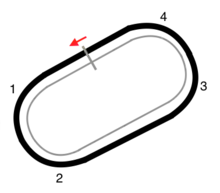| Race details | |||
|---|---|---|---|
| Race 6 of 31 in the 1996 NASCAR Winston Cup Series | |||
 The 1996 Food City 500 program cover, featuring Dale Earnhardt. Artwork by Sam Bass. | |||
| Date | March 31, 1996 | ||
| Official name | 36th Annual Food City 500 | ||
| Location | Bristol, Tennessee, Bristol Motor Speedway | ||
| Course |
Permanent racing facility 0.533 mi (0.858 km) | ||
| Distance | 342 laps, 182.286 mi (293.36 km) | ||
| Scheduled Distance | 500 laps, 266.5 mi (428.89 km) | ||
| Average speed | 91.308 miles per hour (146.946 km/h) | ||
| Pole position | |||
| Driver | Roush Racing | ||
| Time | 15.527 | ||
| Most laps led | |||
| Driver | Jeff Gordon | Hendrick Motorsports | |
| Laps | 148 | ||
| Winner | |||
| No. 24 | Jeff Gordon | Hendrick Motorsports | |
| Television in the United States | |||
| Network | ESPN | ||
| Announcers | Bob Jenkins, Ned Jarrett, Benny Parsons | ||
| Radio in the United States | |||
| Radio | Motor Racing Network | ||
The 1996 Food City 500 was the sixth stock car race of the 1996 NASCAR Winston Cup Series and the 36th iteration of the event. The race was held on Sunday, March 31, 1996, in Bristol, Tennessee at Bristol Motor Speedway, a 0.533 miles (0.858 km) permanent oval-shaped racetrack. The race was shortened from its scheduled 500 laps to 342 laps due to rain. At race's end, Hendrick Motorsports driver Jeff Gordon would manage to dominate a majority of the race to take his 12th career NASCAR Winston Cup Series victory and his third victory of the season.[1][2] To fill out the top three, Hendrick Motorsports driver Terry Labonte and Roush Racing driver Mark Martin would finish second and third, respectively.
Background

The Bristol Motor Speedway, formerly known as Bristol International Raceway and Bristol Raceway, is a NASCAR short track venue located in Bristol, Tennessee. Constructed in 1960, it held its first NASCAR race on July 30, 1961. Despite its short length, Bristol is among the most popular tracks on the NASCAR schedule because of its distinct features, which include extraordinarily steep banking, an all concrete surface, two pit roads, and stadium-like seating. It has also been named one of the loudest NASCAR tracks.
Entry list
- (R) denotes rookie driver.
Qualifying
Qualifying was split into two rounds. The first round was held on Friday, March 29, at 3:00 PM EST. Each driver would have one lap to set a time. During the first round, the top 25 drivers in the round would be guaranteed a starting spot in the race. If a driver was not able to guarantee a spot in the first round, they had the option to scrub their time from the first round and try and run a faster lap time in a second round qualifying run, held on Saturday, March 30, at 12:30 PM EST. As with the first round, each driver would have one lap to set a time. For this specific race, positions 26-32 would be decided on time,[3] and depending on who needed it, a select amount of positions were given to cars who had not otherwise qualified but were high enough in owner's points.
Mark Martin, driving for Roush Racing, would win the pole, setting a time of 15.527 and an average speed of 123.578 miles per hour (198.880 km/h).[4]
Six drivers would fail to qualify: Mike Wallace, John Andretti, Johnny Benson Jr., Dave Marcis, Bobby Hillin Jr., and Chuck Bown.
Full qualifying results
Race results
References
- ↑ Higgins, Tom (April 1, 1996). "Gordon `rains' in Bristol victory". That's Racin'. The Charlotte Observer. Archived from the original on August 15, 2000. Retrieved October 13, 2022.
- ↑ Harris, Mike (April 1, 1996). "Rain is Gordon's friend". Public Opinion. p. 16. Retrieved October 12, 2022 – via Newspapers.com.

- ↑ "Food City 500". The Charlotte Observer. March 29, 1996. p. 15. Retrieved October 13, 2022 – via Newspapers.com.

- ↑ Harris, Mike (March 30, 1996). "Martin zips to Bristol pole". Messenger-Inquirer. p. 17. Retrieved October 12, 2022.
